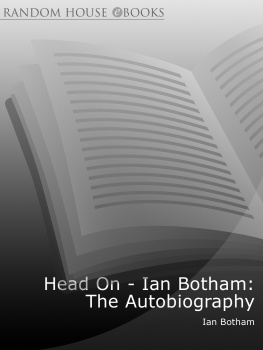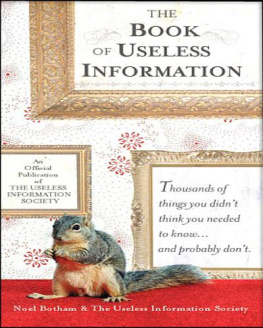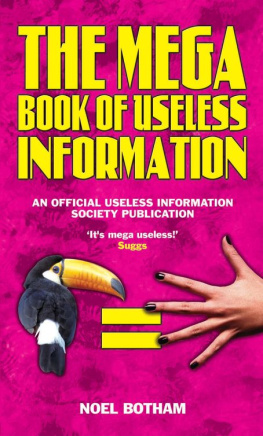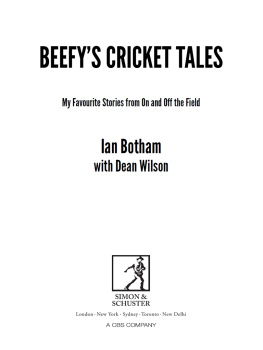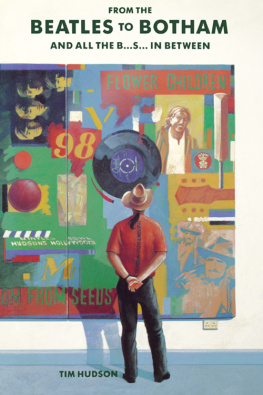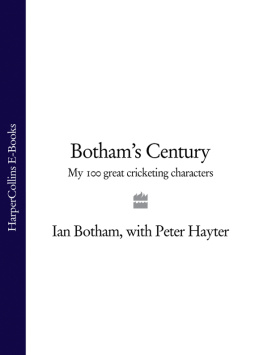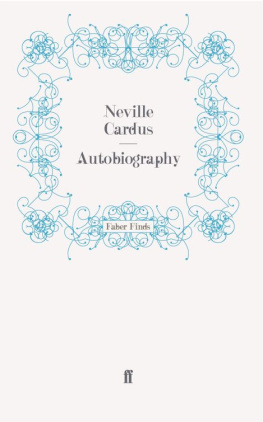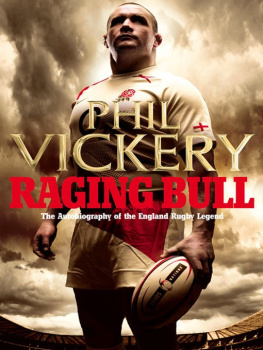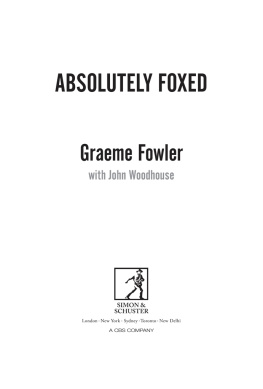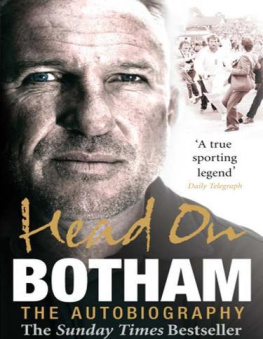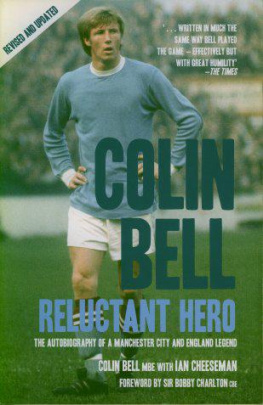Botham - Head on: the autobiography
Here you can read online Botham - Head on: the autobiography full text of the book (entire story) in english for free. Download pdf and epub, get meaning, cover and reviews about this ebook. City: London;England, year: 2008, publisher: Ebury Publishing, genre: Non-fiction. Description of the work, (preface) as well as reviews are available. Best literature library LitArk.com created for fans of good reading and offers a wide selection of genres:
Romance novel
Science fiction
Adventure
Detective
Science
History
Home and family
Prose
Art
Politics
Computer
Non-fiction
Religion
Business
Children
Humor
Choose a favorite category and find really read worthwhile books. Enjoy immersion in the world of imagination, feel the emotions of the characters or learn something new for yourself, make an fascinating discovery.
- Book:Head on: the autobiography
- Author:
- Publisher:Ebury Publishing
- Genre:
- Year:2008
- City:London;England
- Rating:3 / 5
- Favourites:Add to favourites
- Your mark:
- 60
- 1
- 2
- 3
- 4
- 5
Head on: the autobiography: summary, description and annotation
We offer to read an annotation, description, summary or preface (depends on what the author of the book "Head on: the autobiography" wrote himself). If you haven't found the necessary information about the book — write in the comments, we will try to find it.
Botham: author's other books
Who wrote Head on: the autobiography? Find out the surname, the name of the author of the book and a list of all author's works by series.
Head on: the autobiography — read online for free the complete book (whole text) full work
Below is the text of the book, divided by pages. System saving the place of the last page read, allows you to conveniently read the book "Head on: the autobiography" online for free, without having to search again every time where you left off. Put a bookmark, and you can go to the page where you finished reading at any time.
Font size:
Interval:
Bookmark:
About the Book
Voted the greatest English cricketer of the 20th century by the fans, Sir Ian Botham is the English games one true living legend and his story both on and off the pitch reads like a Boys Own rollercoaster ride. From the Miracle Ashes of 1981 to the wrong kind of headlines with accusations of drink and drugs, affairs and ball-tampering Beefy gives us the definitive story of his turbulent but remarkable life in his own bluff, no-nonsense words.
Contents


To Lady B
Chapter 1
YEOVIL BOY WINS GAME
TWO OF MY distinguishing features were evident almost from the day I was born. I weighed in at an eye-watering ten pounds one ounce Beefy from the start and from my youngest days I had an unshakeable self-confidence and belief in my own abilities though others might have found less flattering ways to describe it.
My parents were desperate for children but had been forced to endure the heartbreak of a succession of miscarriages. My poor mother, Marie, had miscarried four times, then almost lost me too. She was hospitalised from the third month of pregnancy and at one point was so ill that the doctors were resigned to her losing the baby yet again, and were more concerned to protect her health. What made it worse was that for much of the time, she had to endure the pain, the sickness and the mental torment on her own, for my father, Les, serving in the Fleet Air Arm as a Petty Officer, was stationed in Northern Ireland at the time.
Yet somehow she found the strength to battle through it all and on the damp, grey evening of 24 November 1955, their first child, Ian Terence Botham, was born. Les didnt see his son and heir until he arrived home on leave a week later. Our home was then in Cheshire, but my parents were so fed up with the long separations from each other that, shortly after I was born, we moved into Royal Navy married quarters in Londonderry. I was too young to remember it but my mother later spoke of a draughty, cold and damp house on a windswept hill overlooking the city. This was in 1956, before The Troubles had begun to flare once more, but it was still a place of simmering hostility between the Protestant and Catholic communities, with the British forces maintaining an uneasy presence between them.
If the surroundings were less than ideal, my parents were very happy there with the baby for whom they had waited so long. My father, Les, was tall but whippet thin, one of the characteristics I clearly didnt inherit from him. He could eat anything he liked and never put on an ounce of weight, and he always had energy to burn, organising friends and workmates for impromptu football kickabouts in the nearest park. He was an old-fashioned, honourable man his word really was his bond quite fixed in his opinions and, in an understated way, a quietly determined man. If he set his mind to anything he would usually achieve it. He was also a disciplinarian though not a martinet; my mum was actually the more steely character of the two.
She was larger than life, warm, loving, gregarious and garrulous, and always enjoyed a party and a glass of wine. Although she was a keen sportswoman and took a lot of exercise, she worried about her weight, constantly taking up one diet after another, and just as constantly breaking them. Im just having this as a little treat, shed say, tucking away another cake or chocolate.
After all the setbacks and hardships my parents had been through, probably no child was ever more eagerly anticipated nor more dearly loved. Their baby could do no wrong and throughout my childhood I was indulged shamefully, spoilt rotten, in fact. Like all parents, my mum and dad were convinced that their child was highly gifted and destined for great things, but in this case it might have had some basis in fact because I did show an unusual self-confidence and resourcefulness from the moment I could crawl. One day, Mum left me playing with some toys inside the playpen in the living room while she went to do some jobs in the kitchen. A couple of minutes later she felt a small hand on her ankle, looked down and found me crawling round her feet. Puzzled perhaps she only thought shed put me in the playpen she carried me back to the living room and then went back to her work.
When I came crawling back into the kitchen again a few minutes later, she knew something was going on. She put me back in the playpen once more and then spied on me through the crack in the door. As soon as she was out of sight, I lifted up one side of the playpen, balanced it on the toy box while I crawled underneath and then put it back in position, leaving everything apparently undisturbed and no visible clue as to how the crime had been committed. When I was left outside the house in my pram, even with the brake fully on, I bounced up and down so much that it would slowly but steadily move down the hill. I managed to cover some fairly impressive distances that way but luckily everyone on the estate knew who I was and would intercept me and wheel me back to the house.
In February 1957, my mother gave birth to my sister Dale. By then I was fifteen months old and walking, greatly increasing the range and scope of my activities and the anxiety levels of my long-suffering mum and dad. The garden at the back of the house was surrounded by a wooden fence that my dad had put up in an unsuccessful attempt to curb my wanderlust; if I could not walk round or crawl under something, I would just climb over it instead. Many times my mum or dad looked out into the garden where they had left me playing happily a few minutes before, only to discover that it was now deserted. The only sign of my escape route was often the dungarees that I had snagged climbing over the fence and then abandoned. On one occasion, still less than eighteen months old, I even got as far as the drivers seat of an Army truck. The cab was so high off the ground that nobody could work out how I got there, and the fact that, having got bored with the steering wheel, I was playing with the handbrake when I was found, added a few more to my parents rapidly increasing store of grey hairs.
My taste for adventure sometimes put me in harms way, and in Londonderry I made the first of several trips to hospital after falling off a wall and cracking my head. I was kept in hospital for four days for observation, and though I was eventually given the all-clear, the doctors there were sufficiently concerned to suggest that I should wear protective headgear for a while. Dad made me a foam-rubber helmet to protect my head, though a full body-suit might have been a better idea; it would certainly have saved him from at least some of the subsequent trips to the casualty department to treat my latest cuts, abrasions and broken bones.
Then, as now, I chafed at any restrictions that others tried to impose on me, and my hyper-competitive instincts also came to the surface. After eighteen months in Northern Ireland, my dads tour of duty there ended and we went back to Cheshire where, during a toddlers race at the naval bases sports day, I eliminated most of the opposition by the simple expedient of barging into them and knocking them flat. The race was mine for the taking, but instead of hightailing it for the tape, I stopped to see what the others were up to. As a result, virtue had its just reward, and having got back to their feet they all went roaring past me, leaving me well down the field when I finally reached the tape. Those who have batted with me over the years will confirm that running twenty yards or so never became my strong point.
In 1958, after just one year in Cheshire, we moved again, to Yeovil in Somerset, when my dad reached the end of his term of service with the Fleet Air Arm. He was offered promotion if he signed on for a further term, but he opted instead for civilian life, and a job with Westland Helicopters in Yeovil. The job gave him financial security but it also meant that he was home a lot more often and I think that was at least as important a factor in his decision; he had been away a lot when I was very young. From then on, he was always available if I wanted to play cricket or football. Hed bowl to me endlessly or go in goal while I practised my penalty-taking technique, and hed referee seven- or eight-a-side games that hed organise, rounding up all the kids and heading down to the local playing fields the Mudford Rec.
Next pageFont size:
Interval:
Bookmark:
Similar books «Head on: the autobiography»
Look at similar books to Head on: the autobiography. We have selected literature similar in name and meaning in the hope of providing readers with more options to find new, interesting, not yet read works.
Discussion, reviews of the book Head on: the autobiography and just readers' own opinions. Leave your comments, write what you think about the work, its meaning or the main characters. Specify what exactly you liked and what you didn't like, and why you think so.

